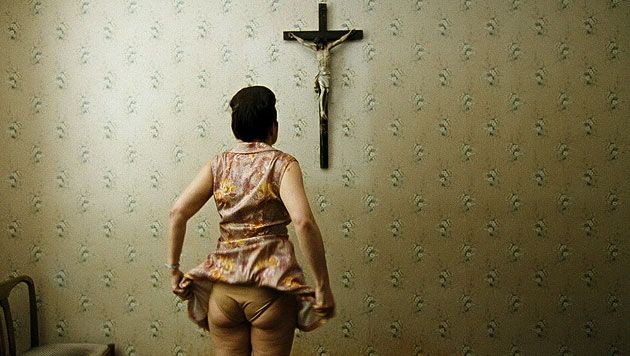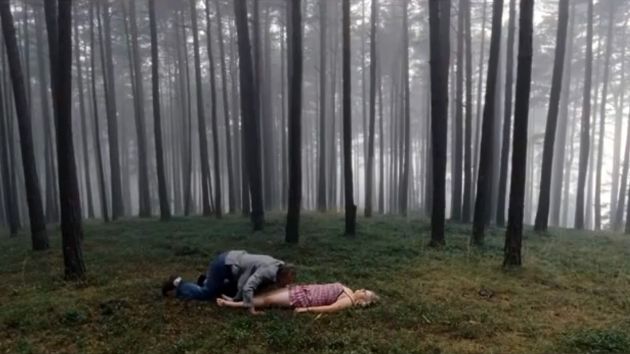Paradise: Faith (2012) - Seidl

The second installment of the Paradise Trilogy by Austrian provocateur Ulrich Seidl, Paradise: Faith first had its premiere at the Venice Film Fest last year (Love at Cannes 2012 and Hope at the Berlinale 2013). And it will be screening as a part of Film Comment Selects preview at the FSLC this weekend (April 26-27). It is by far the strongest and most affecting effort among the three.
Paradise Faith tells a story of Annamaria (played with an uninhibited gusto by Maria Hofstätter), last seen in Paradise Hope, helping her sister Teresa (Margarete Tiesel) prepare for her vacation to Kenya. She is a Catholic whose devotion verges on fanaticism. Like her sister, Annamaria is taking the summer off. But instead of going on a third-world sex tour, she is staycationing: taking a break from her job at a medical lab so she can devote herself to door-to-door missionary work. She is seen flagellating herself in front of a giant cross, atoning for everyone's carnal sins in her immaculately kept, sterile house. She is also seen hobbling around on her knees from room to room, wearing a metal cilice around her waist while praying. If that's not too crazy, she sweet-talks to the portrait of Jesus on her bedside table. It is quite apparent that her love for Christ is something more than spiritual: she even takes the cross to her bed.
Given Seidl's reputation for depicting an unflattering side of humanity, one should expect that any new film by him would be an uncomfortable ride. But with Faith, Seidl seems to be pushing the envelope a little further, making the film a borderline absurdist comedy. Among the trilogy, Faith is definitely the most laborious one in terms of a plot development. But it doesn't diminish its greatness one bit.
Annamaria, with her hair in a tight bun, is almost cartoonish, typifying general image of what 'the church lady' looks like. Why does she think the world is such a sick, ugly place? Seidl answers this question with her stumbling upon an outdoor orgy: the sight is uglier and more graphic than the one in Dog Days. Annamaria, horrified but frozen, watches it for a long time before she turns away. Then, more of self-flagellation. She believes that god is testing her. But lately, these tests seem to be more frequent.
As we wonder about just what made her the way she is, her estranged paraplegic Muslim husband Nabil (Nabil Saleh, a non-actor in his first role) shows up in her life again after 2 years absence. I mean, this premise could easily be the next TLC reality TV show Sweet Jesus, I'm Living with My Paraplegic Muslim Husband. Actually, it's a real life story based on one of the participants in Seidl's documentary, Jesus, You Know. We learn that his current invalid state is the result of his drinking problem (automobile accident). And Annamaria took it as a sign of her sinful life, hence her fanatic devotion to Christianity. He is back now, fully expecting to continue their lawful matrimony. Things soon turn sour. It's a vicious physical battle as well as a spiritual one. This is all too much for Annamaria. Something's gotta give!
In line with 'the Seidl method', Faith has actors and non-actors alike improvising scenes without a script, shooting in real locations and in chronological order. And the result is a truly authentic experience. In Faith, when its all said and done, despite its many ridiculous, over the top situations, we can still take away witnessing some of the most miraculously uninhibited performances. There are some really tough physical scenes as Annamaria violently wrestles with her unwilling convertees and have a tit-a-tat swatting match with Nabil. These long takes are hilarious and fascinating yet one can feel the real physical danger. For the fact that Seidl manages to make these normal people bare their body and soul in front of camera so naturally, transforming themselves into little brandos before your eyes is quite astounding. The trust that these performers have in him must be enormous.
In the end, as Annamaria struggles with her faith, one feels overwhelming empathy for her. There is definitely a method in Seidl's madness and behind all his antics and ugliness, there is a wealth of humanism. Definitely one of the truly great films I've seen this year so far.
Ulrich Seidl will be on hand for a discussion about the Trilogy. For more information, please visit FSLC website.

